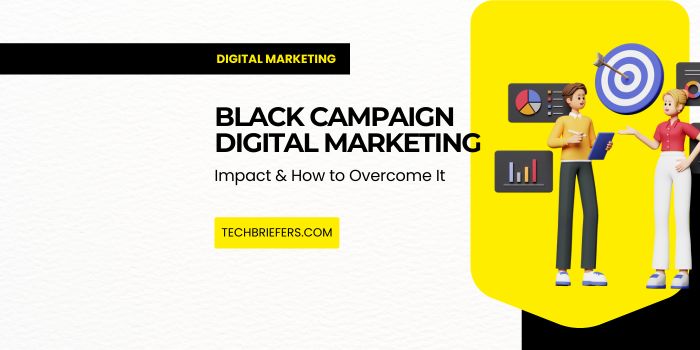Black Campaign Digital Marketing: Impact & How to Overcome It

Do you know what a black campaign is in digital marketing? Nowadays, every brand is competing to attract the audience’s attention in various ways, from building brand awareness to maintaining engagement.
But, behind the ethical strategy, there is a dirty tactic called the black campaign. This is a cunning technique to bring down competitors or deceive consumers.
What is the Black Campaign?
A black campaign is a strategy, deliberately designed to damage a competitor’s image by spreading false information, manipulating facts, or using lies.
In contrast to ethical digital marketing strategies focusing on product excellence, black campaigns tend to be more aggressive and detrimental.
In black campaigns, perpetrators often utilize various online platforms such as websites, social media, and email marketing to spread negative messages.
The content that is spread usually consists of slander, fake news, or even data manipulation to make it look like fact.
Although in the short term, this strategy can provide benefits for the perpetrator, in the long term, it is very risky because it can destroy the reputation of both the perpetrator and the industry affected.
Also Read: What is Affiliate Marketing Program and its Benefits
Examples of Black Campaigns in Digital Marketingˀ
To give you a clearer picture, here are some examples of these dirty campaigns:
#1. Fake Reviews
One common example of this campaign is fake reviews that are intentionally created to denigrate a competitor’s product or service. These negative reviews can be written by anonymous accounts or bots that are intentionally created to attack a competitor’s reputation.
The goal? Of course, it reduces consumer trust in competitor products. For example, you have an online fashion business, then suddenly your product is attacked with various bad reviews for no apparent reason. This can make potential consumers hesitate to buy your product and switch to competitors.
#2. Negative SEO
SEO (Search Engine Optimization) is a vital element in digital marketing that focuses on improving website rankings in search results. But, in the case of black campaigns, there is something called negative SEO.
This is a practice where the perpetrator intentionally creates bad backlinks that point to a competitor’s site or even reports the competitor’s website to Google for violating the rules.
For example, you have worked hard for months to optimize SEO on your website. Suddenly, because of a negative SEO attack, your website’s position drops drastically from the first page to a page far behind.
The impact? Of course, it is huge, from lost traffic to decreased conversions.
#3. Spread of Hoaxes
There are also cases where black campaigners spread false information or hoaxes about competitors’ products or services.
They can spread fake news that leads public opinion to believe that competitors’ products are dangerous, unsafe, or problematic, without any valid evidence.
For example, you have a food business, and suddenly there is a rumor circulating that your product is unhygienic or contains hazardous materials. Even though there is no evidence, rumors like this can spread quickly on social media and damage consumer trust.
#4. Phishing and Fraud
Another fraudulent method often used in black campaigns is phishing. The perpetrator creates a fake website that resembles a competitor’s to steal customer data or other sensitive information.
In addition, they can also send fake emails that appear to come from competitors with the aim of damaging the competitor’s reputation or creating chaos.
Also Read: Influencer Marketing: How online influencer marketing works?
The Impact of the Black Campaign
Conducting a black campaign in digital marketing may seem profitable at first, but the long-term effects are very detrimental to all parties involved.
Here are some negative impacts of black campaigns:
#1. Losing Public Trust
Broken customer trust can be detrimental to your business. Once this dirty trick is exposed, public trust in the perpetrator’s brand will be destroyed.
Consumers who feel betrayed will abandon the product or service, and worse, they may spread the word about their bad experience, widening the negative impact.
#2. Lawsuit
Many forms of black campaigning are illegal, such as spreading slander or defamation. If the perpetrators are caught, they can face legal action from the injured party.
In addition, perpetrators can also be subject to large fines or other financial losses that are much greater than the short-term profits obtained.
#3. Damaged Reputation in the Eyes of the Industry
In the business world, reputation is everything. Engaging in unethical practices such as black campaigns can destroy the actor’s credibility in the eyes of competitors and the industry community.
This can have an impact on business relationships, collaboration with partners, and opportunities to develop a business.
#4. Domino Effect on Consumers
Ironically, consumers can also be affected by this underhanded strategy. They may be influenced by false information and end up buying products that do not meet their expectations.
This creates a cycle of dissatisfaction that ultimately hurts consumers and impacts the reputation of the industry as a whole.ˀ
How to Deal with Black Campaign
Dealing with a black campaign can be a challenge for business owners.
If your brand is the target of this attack, the following strategic steps can help you minimize the potential impact:
#1. Actively Monitor Reputation
The first step you should take is to monitor what is being said about your brand online. By using tools like Google Alerts or a social media management platform, you can quickly track rumors or negative information circulating.
Also Read: Top 5 Effective Email Marketing Tips
#2. Avoid Overdoing It
When your brand is the target of a smear campaign, your first instinct may be to respond quickly. However, it’s important not to overreact.
Many consumers are smart and can distinguish real news from fake news. Instead of rushing to respond, take the time to understand the issue.
Coordinate with internal teams to ensure that you have a clear understanding of the situation before developing a communication plan.
#3. Respond with Facts
If you find any misinformation or hoaxes about your brand, don’t stay silent. Immediately make a clear and firm official statement, then spread it through existing communication channels, such as social media and official websites.
#4. Strengthen Relationships with Consumers
One of the best ways to combat these underhanded tactics is to build strong relationships with your customers. When they feel connected and trust your brand, they are less likely to be swayed by negative information.
Make sure to communicate openly and transparently, and show that you care about them. That way, consumers will be your strongest support.
Also Read: 50 Digital Marketing Interview Questions with answers
#5. Fix the Highlighted Points
Once you know the areas that are being targeted by the smear campaign, focus on making improvements there. For example, if your brand is being highlighted for poor customer service, work on improving that area.
When customers are satisfied with the service you provide, the issues raised by the black campaign will lose their impact.
#6. Increase Education and Branding
Continuous education about your product is key to combating this underhanded tactic. Create informative content through channels like blogs, social media, or podcasts to provide accurate and useful information to customers.
This method can improve the brand image while providing information that can help consumers make better decisions.
#7. Involve Legal Parties if Necessary
Finally, if the situation worsens and your reputation is being attacked illegally, do not hesitate to involve the legal authorities. Legal action may be necessary to protect your business from unfair attacks.
Conclusion
Black campaigns in digital marketing are very detrimental practices and should be avoided in business competition. This strategy not only damages the target’s reputation but can also destroy the credibility of the perpetrator.







Leave a Reply